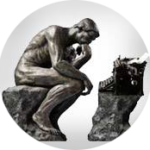Ilike turning huge chunks of hard-to-digest information into bite-sized works of art. That, for me, is what science fiction does. Particularly hard science fiction. What gave me the mad idea to mix hardcore scientific facts with stories of the supernatural? The crazy combination got triggered decades ago. I was in high school when our house caught fire. The entire second floor was ravaged, and the ground floor was nothing but rubble after that. It took over a year, but my parents managed to rebuild a beautiful house to take its place.
Shortly after we moved in, that’s when the hauntings began.

My sister woke up one morning to see two strangers in her room, dressed in old world attire, and then faded away. My other sister was walking in the garden and something unseen pushed her, making her stumble forward. An overnight guest said that he ended up with bruises on his body the next day, as though someone had pinched him in the middle of the night. And no, they weren’t bug bites. My father was sitting in the living room, reading the newspaper, and he suddenly smelled the unmistakable odor of freshly turned earth. This happened for two or three consecutive days, precisely at sunset. He didn’t know that while he was away on a trip, one of our dogs had been found dead in his sleep under that chair where my father had been sitting. For years, footprints of little children would mysteriously appear on the floor tiles, like chalk drawings that couldn’t be erased, whenever a new house helper was hired. These faded away on their own.
All of these happened decades ago, in the 70s. The house has since been remodeled and no new stories have emerged.
I wasn’t even a teenager yet when all this started. But the need to find a logical explanation for these and more incidents never left me. I finished high school, got a bachelor’s degree in journalism, eventually ended up a copywriter in advertising, and have since established my own ad agency. Through all these milestones, one thing never left me. The desire to find an explanation.
Finally, with a family of my own, the kids grown up, and with relatively more free time to use as I wished, I began writing. And researching. And forming theories. Until eventually, Immortology—the trilogy—was born.
My growing up years
At eight years of age, I struggled with mathematics. My father was great with numbers, but I didn’t get his genes. To inspire me, my mother bought me a math notebook. One hundred sheets of gridded paper held together by a shiny, spiraling spine. Its pages felt so smooth and looked so neat, I couldn’t resist filling them up—not with equations, but with short stories that I wrote myself.
When I showed the spiral notebook again to my mom, she looked so amazed and told me to have my father have a look, too. He seemed equally impressed. So, I decided right then, I was going to be a writer when I grew up.

That was way back in the 1960s, when Reader’s Digest was the world’s No.1 magazine. I’d told my mother I wanted to be its editor-in-chief someday—thinking it meant I’d be chief of all writers of the world’s most popular magazine. So, she showered me with books and deepened my love for the written word.
That same decade, humankind landed on the moon, and Neil Armstrong became my first-ever celebrity idol. He didn’t inspire me to go to outer space, but he made me want to learn all about it. At an early age, I began reading about quasars and pulsars. White dwarfs and red giants. Black holes and worm holes. For several years, I teetered over what I wanted to be. An astronomer? Or a writer?
I lived in a time and place where science wasn’t considered “money making.” Perhaps you could say, neither was writing—since J.K. Rowling, back then, was even younger than Harry Potter had been when he found out he was a wizard. What tilted the balance was practice. All I could do about outer space was read about it. Whereas reading—about anything and everything—helped me learn and love the craft of writing.
Before I hit my teens though, that plan hit a hump. I was playing hopscotch a short distance from the front porch where my sister was entertaining a suitor. They were talking about college, and he said he had shifted from taking up English to Economics. When my sister asked why, my ears perked up, and I paused my play to make sure I caught his next words. “Anyone can be a writer,” he'd said and instantly burst my bubble full of dreams. I don’t remember anything else. Nothing about why economists are better than writers. Or even if my sister cared. The conviction that burned into my soul was: I didn’t want to write just like "anyone."
When it came time for me to choose my university degree, my memory of that visitor who had changed his college course made we steer away from a Bachelor of Arts in English. So, I scanned my high school grades and noted that the highest ones were in Chemistry and, well…English. I was back to teetering between science and writing, so I applied for two courses in two different universities. One was for Journalism. The other, Chemical Engineering.
I passed in both. What tilted the balance? Mathematics.
Journalism only had three units of it. And not even a gilded math notebook from my mother would have convinced me to take on the advanced units required for the other course.
 Eventually, I realized reporting the news wasn’t the kind of writing I wanted to do. My childhood dream of becoming an editor came back to haunt me, and the first job I took after graduating was that of editorial assistant at a publishing firm. But that left me unfulfilled. I wanted to create work I could call my own. So, I scoured the newspapers until I found an opening where my writing skills could be put to good use. I found it in advertising as a copywriter—and for the past several decades, that industry has kept me occupied. Within that world of taglines and jingles and thematic campaigns, I rose to the level of Vice-President and Executive Creative Director of a top global ad agency. Eventually, I set up my own advertising firm with a few partners, and I sit at its helm to this day.
Eventually, I realized reporting the news wasn’t the kind of writing I wanted to do. My childhood dream of becoming an editor came back to haunt me, and the first job I took after graduating was that of editorial assistant at a publishing firm. But that left me unfulfilled. I wanted to create work I could call my own. So, I scoured the newspapers until I found an opening where my writing skills could be put to good use. I found it in advertising as a copywriter—and for the past several decades, that industry has kept me occupied. Within that world of taglines and jingles and thematic campaigns, I rose to the level of Vice-President and Executive Creative Director of a top global ad agency. Eventually, I set up my own advertising firm with a few partners, and I sit at its helm to this day.
Whenever I have the chance, I type down a few hundred words into my computer and do my best to weave them into stories others would appreciate. Believe it or not, I still scribble my thoughts down on spiral notebooks first. One of them still happens to be a gridded math notebook. Sadly, my mother and my father aren’t around anymore. I can’t show them what I'd written so I could make them proud and see their smiles. Part of me hopes they still know about it though, wherever they are. And it’s that hope that fuels the topics of most of my stories.
What happens to the best of our memories when life comes to an end? I let my writing fill in the blanks that science has yet to fill.


